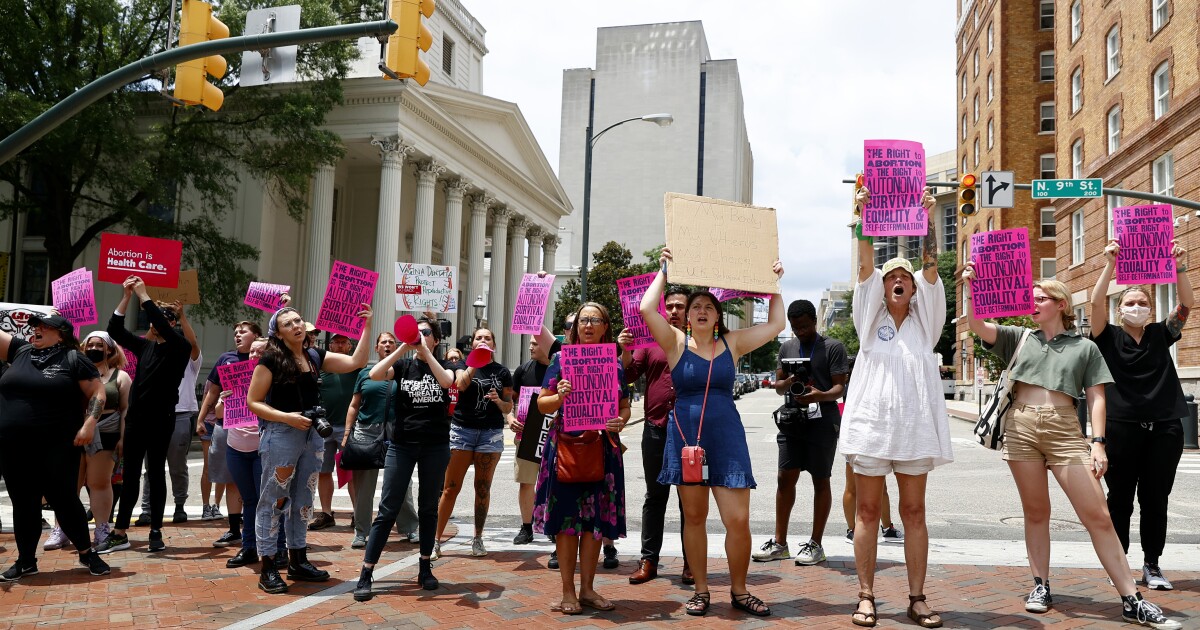

Ramifications from last week’s Supreme Court ruling that whisked away the nationwide right to an abortion could shake up state legislative races heading into the midterm elections as states grapple with their newfound powers to regulate the bitterly contentious issue.
Since 2011, Republicans have held a robust command of state legislatures across the country and currently dominate just shy of two-thirds of state Houses and Senates. But over a dozen of those chambers are held by razor-thin margins, making Republican dominion vulnerable to collapse as abortion shock waves place a renewed focus on local races.
DEMOCRATS ARE PANICKING BECAUSE ROE WAS NEVER AS POPULAR AS THEY PRETENDED
“It is hard to look past the anger that I and so many women across the country feel right now. From the President to the Congress to our local State Legislatures, elections matter now more than ever,” Rep. Debbie Stabenow (D-MI) tweeted over the weekend.
Stabenow does not appear to be alone in her sentiment. A recent CBS/YouGov poll found that 67% of women, out of 2,265 people polled, disapproved of the Supreme Court’s decision. The poll was conducted from June 24-25 and had a 3-point margin of error.
The legislature in Stabenow’s home state of Michigan is one example of a state with tight Republican control. The GOP holds the state House 57-53 and the Senate 22-16. President Joe Biden and Gov. Gretchen Whitmer (D) both won the state narrowly during their last respective elections, demonstrating Democrats’ ability to be victorious in statewide races there.
Whitmer has threatened to veto legislation banning abortion in the Great Lake State and has waged a court battle against a 1931 law prohibiting abortions. She appears keen on making her defense of a woman’s right to terminate her pregnancy the centerpiece of her campaign, adamant that there is “no common ground” and hopeful that disgruntled voters could tip the scales of power in the legislature back to Democrats.
In total, there are at least eight states where Republicans hold a narrow control of a chamber in the state legislature that could be vulnerable to backlash from the Supreme Court’s abortion ruling.
To the southwest, Arizona faces a very similar situation. The once bright-red state has trended purple in recent years, and Republicans are barely clinging to a razor-thin 31-29 majority in the state House and a 16-14 majority in the Senate. Like Michigan, the state has a 1901 law that mandates jail time for those who perform abortions, which has catalyzed legal confusion now that precedents first established in Roe v. Wade have been scrapped.
Elsewhere, Republicans have a slight edge, boasting a 14-10 advantage in the New Hampshire Senate, a 28-22 lead in the North Carolina Senate, and a 28-21 edge in the Pennsylvania Senate. All three of those states have been competitive battleground states and are currently ruled by pro-abortion rights governors.
In Virginia, Republicans recently procured a 52-48 majority in the House of Delegates while reducing Democrats to a narrow 21-19 lead in the Senate. The state has trended blue over recent years, and Gov. Glenn Youngkin (R) has pitched a 15-week ban on abortion, refraining from a more aggressive proposal in hopes of winning points with his base while avoiding substantial backlash from general election voters.
Even Alaska, a state where Republicans have traditionally performed well, could see a backlash from last week’s political earthquake. Republicans hold the state House 21-15 and Senate 13-7. The state was one of the first in the country to liberalize abortion before Roe, and Gov. Mike Dunleavy (R) has carefully unveiled plans to ask for an amendment to the state constitution on abortion to counter prior state court rules that determined the state constitution guarantees a right to an abortion.
While Democrats have mobilized to capitalize on a possible electoral lifeline from fallout over the abortion ruling, it is unclear if tremors from the abortion earthquake will be enough to stave off the anticipated red wave.
A preview of how abortion shock waves may play out in the political sphere may have recently taken place in Texas. Since late last year, the Lone Star State has imposed a six-week ban on abortions enforced through private lawsuits. Republicans hold the state Senate with a relatively narrow 19-13 majority. Still, Republicans recently eked out a breakthrough victory with new GOP Rep. Mayra Flores flipping a seat in a historic Democratic stronghold.
The Supreme Court’s ruling comes at a time when the United States is reeling from a plethora of crises ranging from declining real incomes, skyrocketing gas prices, unbridled inflation, soaring crime, and a war in Ukraine, souring the mood of voters toward Democrats — as evidenced by Biden’s recent lackluster polling.
CLICK HERE TO READ MORE FROM THE WASHINGTON EXAMINER
Although most polling has found the majority of the public at odds with the Supreme Court decision on abortion, it is not clear that abortion will be the primary issue for voters in the midterm elections.
“Political fallout will take place over several cycles and will depend in part on what bans look like in practice,” Aaron Astor, historian and associate professor at Maryville College, tweeted.







